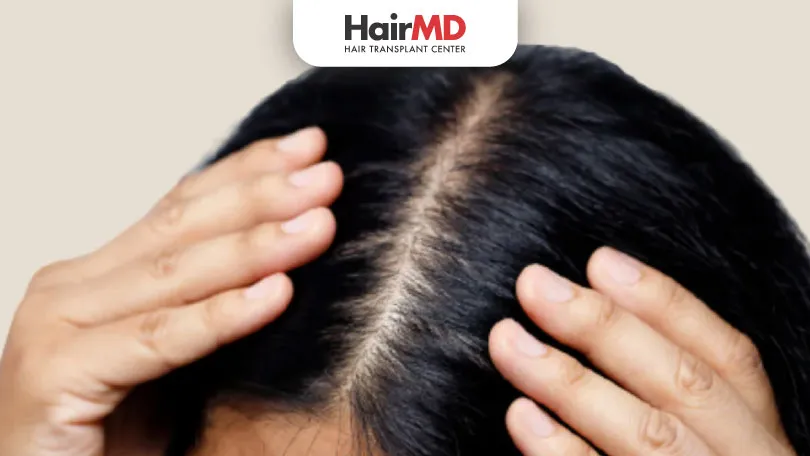11th Feb, 2024

What’s covered in the article?
- What Causes Postpartum Hair Loss?
- How to Manage manage Hair Loss?
- What to Do If Hair Loss is Severe?
- How Does Postpartum Hair Loss Affect New Mothers?
- What Lifestyle Changes Can Help?
- When to See a Dermatologist?
- Conclusion
What Causes Postpartum Hair Loss?
Postpartum hair loss is common among new mothers. To understand why this happens, we first need to look at the hair growth cycle.
The hair growth cycle consists of three main phases: anagen, catagen, and telogen.
Anagen Phase
This is the growth phase where hair actively grows for several years. During pregnancy, the high hormone levels, particularly estrogen, prolong the anagen phase, making hair appear fuller and thicker.
Catagen Phase
This is a short transitional phase where hair growth slows down.
Telogen Phase
This is the resting phase. Hair falls out at the end of this phase and is replaced by new hair growing in the anagen phase.
During pregnancy, the high levels of estrogen keep more hair in the anagen phase, reducing hair fall. However, after delivery, hormone levels drop, and a significant number of hairs enter the telogen phase, leading to increased hair shedding. This sudden shift can be alarming but is a normal part of the postpartum process.
How to Manage Hair Loss?
Postpartum hair loss is temporary but there are several ways to manage it and maintain healthy hair:
Gentle Hair Care
Handle your hair gently. Avoid aggressive brushing and washing. Use a mild shampoo and conditioner to keep your hair clean and moisturized.
Proper Nutrition and Diet
A balanced diet is crucial for new mothers. Your nutritional demands are higher because you are feeding your baby and recovering from childbirth. Ensure you consume enough iron, calcium, vitamins, and omega-3 fatty acids. These nutrients are essential for healthy hair growth.
Adequate Rest
Getting enough rest is important for overall health, including hair health. Try to rest whenever possible and take short breaks to relax and rejuvenate.
Stress Management
Managing stress is vital as it can exacerbate hair loss. Engage in activities that help you relax, such as meditation, yoga, or light exercise. Finding time for hobbies and leisure activities can also help reduce stress levels.
What to Do If Hair Loss is Severe?
If your hair loss is severe and home remedies are not helping, consult a dermatologist.
Here are some medical treatments that may be recommended:
Supplements
Your dermatologist might prescribe supplements like biotin, vitamin D, iron, and omega-3 fatty acids. These supplements can help address nutritional deficiencies that contribute to hair loss.
Topical Treatments
Treatments like minoxidil can be applied to the scalp to stimulate hair growth. These treatments should be used under the supervision of a dermatologist.
Oral Medications
In some cases, oral medications may be necessary. Your dermatologist will evaluate the severity of your hair loss and recommend appropriate medication.
Clinical Procedures
Advanced treatments like Platelet-Rich Plasma (PRP) therapy can promote hair growth. PRP involves injecting growth factors from your blood into the scalp to stimulate hair follicles.
How Does Postpartum Hair Loss Affect New Mothers?
Postpartum hair loss can be distressing and affect a new mother’s self-esteem and confidence. It’s important to remember that this is a temporary phase, and with proper care and treatment, your hair will likely return to its pre-pregnancy state.
Emotional Support: Seek support from family and friends. Sharing your concerns with loved ones can help alleviate stress. Joining support groups where you can connect with other new mothers experiencing similar issues can also be beneficial.
What Lifestyle Changes Can Help?
In addition to medical treatments, making certain lifestyle changes can help manage postpartum hair loss:
-
Healthy Diet
Include plenty of fruits, vegetables, lean proteins, and whole grains in your diet. Foods rich in vitamins and minerals, such as spinach, nuts, seeds, and fish, are excellent for hair health.
-
Regular Exercise
Exercise improves blood circulation, which can promote hair growth. It also helps in managing stress and improving overall well-being.
- Hydration
Drink plenty of water to keep your body and hair hydrated. Proper hydration is essential for maintaining healthy hair.
-
Avoid Heat and Chemicals
Minimize the use of heat styling tools and chemical treatments on your hair. These can weaken your hair and cause further damage.
When to See a Dermatologist?
If you notice excessive hair shedding that doesn’t improve with home care, it’s time to see the best dermatologist. They can provide a thorough evaluation and recommend the best course of treatment based on your individual needs.
Step #1: Diagnosis
A dermatologist will examine your scalp and may perform blood tests to check for nutritional deficiencies or hormonal imbalances.
Step #2: Treatment Plan
Based on the diagnosis, they will create a personalized treatment plan. This plan may include a combination of supplements, topical treatments, and lifestyle changes.
Do You Know?
Nearly 250 Patients Visit HairMD
Everyday For Various Hair Concerns?
(Your journey to healthier and fuller hair starts here!)
Meet Our Dermatologists
Conclusion
Further Reading
How Much Hair Loss is Normal for Teenage Male?
Understand normal hair loss in teenage males and when it may signal an issue. Visit HairMD Pune for expert advice on teenage hair health and treatment options.
Ultimate Food Guide For Healthy Hair
Struggling with hair fall? This Food For Healthy Hair guide shares easy diet tips to support stronger, healthier hair naturally.
How to remove scabs after Hair Transplant? | HairMD
The correct way to remove scabs after hair transplant without damaging grafts. Get expert-backed tips from HairMD Pune to support a smooth recovery.
Is Hair Loss One of the Side Effects of Using Glucosamine?
Explore potential risks & benefits of this supplement for joint health. Get the facts on hair loss & glucosamine use.
Have thoughts? Please let us know
We are committed not only to treating you, but also educating you.











